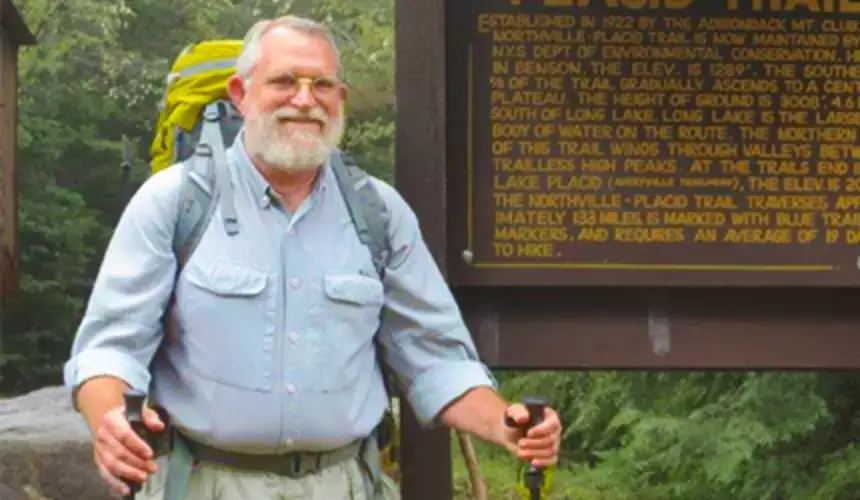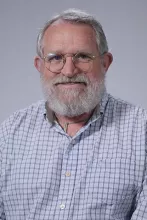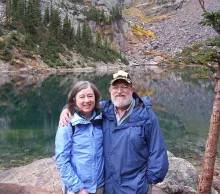
Every day that doesn’t begin with ‘S,’ Snapper Petta and his assistant, Juneau, pack up their things and make their way at about 8:30 a.m. to 459 Hulbert Hall, home of SUNY Oneonta’s Outdoor Adventure Office. On Friday, Jan. 17, they will do this for the last time, as Snapper is retiring after 40 years with SUNY Oneonta.
The walls of the Outdoor Adventure Office are plastered with photos of the Adirondacks, posters identifying different animal tracks, bumper stickers, old skis, feathers, and other odds and ends. A well-loved couch where visiting students often sit is situated near the window, which offers a beautiful view of the hills of Oneonta. Snapper’s computer, desk and chair – a La-Z Boy – are in the corner, and under his feet sits his trusty assistant.
Juneau, as it turns out, is a 4-year-old border collie mix who accompanies Snapper to work every day and has an important job. As a licensed therapy dog, she makes sure everyone who stops by the Outdoor Adventure Office is greeted warmly and is happy and calm.
“The students just love her,” Snapper said, just as a female student pops her head in to pet Juneau’s shiny black fur. “She’s very good for anxiety, especially during finals week. Everyone keeps telling me that I’ll have to bring her back for visits after I retire.”
As director of the university’s Outdoor Adventure Program and adviser to the Outdoor Adventure Club, Snapper has led SUNY Oneonta students on hundreds of outdoor trips, from hiking and skiing locally to whitewater rafting and whale watching excursions in other states. He is also the program director for College Camp; leads various wilderness safety and leadership trainings with his staff and other university employees around campus; and is in charge of the bouldering room located in Ford Hall, which is open Wednesday nights for student use.
Favorite Adventures
Snapper used to take students on multi-day, out-of-state trips over university breaks but, due to changes in university scheduling, all adventures now take place over the weekend and are day trips. Snapper is present on 90 percent of those trips, along with several of the student “guides” that work for him.
It was on these trips that Snapper experienced the most rewarding moments of his career.
“One sticks out in particular – We had a student who was born and raised in South Bronx, and until he came here he had only ever been there,” Snapper recalled. “I invited him on one of our trips to the Adirondacks – a hardcore one, 6 days – and he came! One night, I found him sitting down by the lake by himself, looking up at the stars and listening to the loons. He was quiet, and I asked him how it was going, and he said ‘I really just can’t believe this is the same state I grew up in.’ I’ve had a lot of those types of moments. When you really see how the outdoors resonates with students and becomes important to them.”
Other favorite memories include trips to the Okefenokee Swamp – one such trip Snapper recalls with a bout of his contagious, resounding laughter – and hosting end-of-the-semester potluck dinners for members of the Outdoor Adventure Club e-board at the home he shares with his wife, Marie, who served as director of Bugbee Children’s Center for many years, retiring in 2016. He has always tried to foster an atmosphere where students feel at home and comfortable, and he measures the success of his career, he says, by the number of former students with whom he remains close.
“The number of weddings we’ve gone to and the baby announcements we’ve received and the trips we’ve been invited to go on – that’s really something special,” he said.
After Oneonta
In his retirement, Snapper plans to take a volunteer position with the Adopt A Lean-to Program in the Catskills, do some instructing over the summer, volunteer with The Farmers’ Museum in Cooperstown, and focus on his hobby – writing about 17th and 18th century living. He also plans to stop by campus every once and a while to visit with students and help in any way he can.
Until then, he’ll close out his career in the same way he has, for many years, ended his email correspondences to all colleagues and students – by saying “Be well.”
“I started writing ‘Be well,’ because ‘Sincerely’ is just too formal, and ‘Peace’ wasn’t quite right either,” he explained. “I do try to always think about how I can be of service, how I can make someone’s life better. What can you write that will hopefully give a good message and say ‘I’m hoping for good things for you’? I decided on ‘Be well’ in an effort to try to end on a pleasant, hopefully supportive note. You know, you hope the best for them.”

